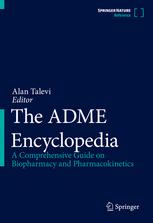An editor who is no stranger to Springer content, thanks to his various roles over the years shares his insight
The role of Editor is demanding to say the least. It requires juggling many balls at the same time and that’s before you take into account the day job! In this series we interview various EiCs/Editors who work on MRWs and Handbooks to get an insight into their role of being at the helm of such voluminous titles that require enormous effort and take years to compile.
Here Alan Talevi discusses why there is no room for stagnant MRWs moving forward and how the “living aspect” of MRWs is here to stay.
 How long have you been an Editor?
How long have you been an Editor?
I was invited to act as Editor of The ADME Encyclopedia back in late 2019, so it has been about three years now. I am also Series Editor of the recently launched Springer Nature’s Computer-Aided Drug Discovery and Design Series, and I have previously been volume editor of a couple of books, so all in all I have been working with Springer for about eight years.
Please give us some background on yourself and what attracted you to this role?
I teach pharmacokinetics at UNLP, where I am also a full-time researcher. I lead a small academic group of about twenty people, whose main focus is on drug discovery. I was mainly attracted to the role owing to two reasons. The Springer Nature’s MRW collection includes really big books or even multi-volume works that aim to cover a given topic comprehensively. Therefore, as I had never embarked on such an ambitious editing project in the past, I was attracted by the challenge and also by the experience I would get from such a role.
Secondly, as scientific knowledge today changes at an impressive rate, I was very attracted by the “living” aspect of MRW. I believe reference works today should not be stagnant anymore, but need constant updates and expansion, and current information technologies are perfectly suitable to meet that goal.
Describe a typical day as an Editor?
It depends on which stage of development of a project you are involved in. At first, most of the efforts focus on screening potential section editors and contributors, preferably considering a global perspective, that is, balancing the contribution from experts from every corner of the world. Once you have the initial list of contributors approximately rounded, your role is mostly limited to answering contributors’ questions on format, content, etc. This is perhaps the calmest part of the whole process. As the editor might be committed to act as an author of some of the content, this stage is ideal to dedicate to that task. Then, as the contributions start arriving, you get mainly involved in reviewing and asking contributors for modifications, if needed. At the end of the process, you are kindly invited by the editorial team to give your opinions and suggestions on design, final structure of the book, and you are also involved in proof corrections. All in all, the editor’s tasks vary greatly depending on which stage you are at.
How do you work with Springer Nature within the role?
You are assigned with a competent team of people that assist you with the more technical aspects of the edition, so that one is mainly responsible for the content aspect of the process. My experience has been very positive in that regard, as the people who assist me in the process were always at my disposal, and willing to solve any doubts or problems.
What do you like about being an Editor?
To be honest, the sense of fulfillment that you experience once the work is materialized. It is, at times, a demanding role, but it is well paid by the sense of realization once you have the printed volume in your hands. I also really like the interaction with the contributors, as many of them are leading experts in the field.
What are the most challenging tasks of the role and how do you tackle them?
Well, some delays or unforeseen issues might appear in the process, as a MRW involves coordinating many people, and if you are a task-oriented person this can be stressful. Fortunately, Springer Nature has always been understanding and flexible in that regard. The editorial team is very helpful and supportive, and have helped me if issues arise.
How has Springer Nature supported you within your role?
The editorial team was always there to solve any contingency, making my role much easier. I felt that I had a supportive experience 24-7.
What advice can you give to someone who has recently stepped into the position of Editor?
As MRWs are ambitious in nature, it is important to plan for the unexpected, and design a reasonable timeline. Delays are almost inevitable, so the role might be a bit more relaxed if you consider them in advance, as a part of the process. Having proficient Section Editors is probably a clever thing to do.
About the author
Alan Talevi is the Head of the Laboratory of Bioactive Research and Development (LIDeB) at the University of La Plata (UNLP, Argentina). Professor of the Biopharmacy course at UNLP. Independent Researcher at the Argentinean Council of Science (CONICET). Former Head of the Department of Biological Sciences at the Faculty of Exact Sciences, UNLP.





